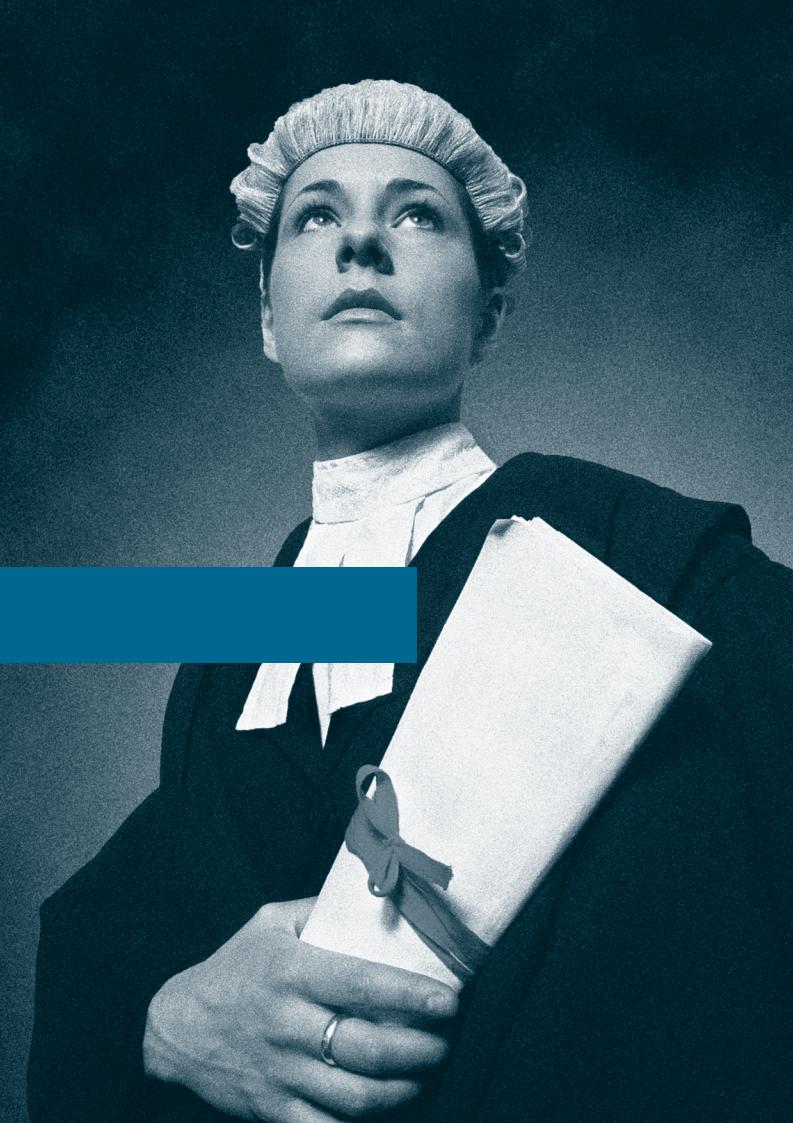
lawyer_s_coursebook_cht
.pdf
The Lawyer’s English
Language Coursebook
Unit 1

THE LAWYER’S ENGLISH LANGUAGE COURSEBOOK
Supporting the TOLES series – ‘the world’s leading legal English examinations’
This is Unit One of the exciting new publication, ‘The Lawyer’s English Language Coursebook’. This is the first unit of a unique ten part coursebook to support students of legal English worldwide, particularly those studying for the TOLES series of exams. The book is divided into easily manageable units, each dealing with vital skills for the modern international lawyer. It takes off from a sensible starting point for both teachers and students and is recommended for learners who are more confident in general English as well as those who are still building their language skills whilst studying or practising law.
The first unit deals with the language of the legal profession and the general areas of law in which lawyers specialise. The complete list of units in the book is as follows:
• The legal profession |
• The language of tort |
• The language of banking & finance |
• The language of employment |
• The language of contract law |
• Accurate letter writing |
• The language of business law |
• Understanding contracts (1) |
• The language of company law |
• Understanding contracts (2) |
WHY IS THIS LEGAL ENGLISH BOOK SO SUCCESSFUL?
This book takes English for Law in a new direction. It is based on consultations with international lawyers as to what skills practising lawyers really need to achieve from their English language studies. Its unique style and approach is the result of hundreds of teaching hours with lawyers and law students from around the world. This book:
•assumes no existing knowledge of law or legal English by either students or teachers. It explains legal vocabulary in a refreshingly clear way.
•builds skills and confidence in legal English from a realistic starting point. It does not ask students to begin with tasks that are beyond their reach.
•keeps a genuine focus on the language of the law and does not ask students to waste time on irrelevant material that they will not require in their chosen career.
•deals with demanding core subjects such as commercial contracts and letter writing in a practical, in-depth way that global law firms require.
•challenges more experienced students to reflect upon deep-rooted mistakes in their legal English and encourages self-correction at every stage of learning.
•is up to date. It takes into account recent language reforms and forthcoming changes to the legal system in the UK.
© Catherine Mason & Rosemary Atkins 2007

THE LAYOUT OF THE BOOK
The book is structured in a user-friendly way and does not ask students to face difficult tasks without the necessary preparation or support.
Each of the ten units is divided into a vocabulary Section A (Foundation) and a working skills Section B (Higher). Section A is vital preparation for the target tasks contained in section B. This structure allows students to develop skills and confidence whilst keeping the focus upon accuracy at all times.
At the end of each section there are some exercises in the style of the TOLES exams which test the vocabulary and skills covered in that section. The ten units in this book vary in length. This is for two reasons. The first is that more challenging areas of study, such as understanding contracts, require more explanation and repetition than others. The second is that the amount of time devoted to each unit reflects its relevance to overseas lawyers.
Section A (Foundation)
•Supports students studying towards the TOLES Foundation examination.
•Familiarises students with essential vocabulary to complete the realistic tasks in Section B.
•Incorporates useful ‘helpdesk’ sections throughout to encourage learner independence.
•A useful study aid in itself towards the entire TOLES exam series.
Section B (Higher)
•Supports students working towards the TOLES Higher examination.
•Encourages active use of the vocabulary introduced in Unit A.
•Based on realistic and stimulating tasks.
•Incorporates useful preposition and collocation banks to assist effective learning.
THE AUTHORS
Catherine Mason and Rosemary Atkins are currently teachers of legal English in Cambridge. They both have a legal background as well as being experienced teachers of English as a foreign language. As a team, they have provided training in legal English for numerous leading law firms around the world as well as working with the staff of organisations such as the British Council and The European Court of Justice.
THE TOLES EXAMINATION SERIES
The TOLES examinations are the world’s market leaders in legal English examinations. Many organisations have already entered candidates, including the Law Society of England & Wales.
If you would like to know more about TOLES and how the exam series can support you and your students please contact the TOLES office at info@toles.co.uk.
We hope that you find this unit of the book useful and that you enjoy using it.
© Catherine Mason & Rosemary Atkins 2007

The Legal Profession
Unit 1A/Foundation

THE LEGAL PROFESSION
WORKING IN LAW
Exercise 1
Look at this list of legal occupations. All of these people work in law. We call all of the people who work in these jobs, ‘the legal profession’. Match the jobs with one of the descriptions.
Solicitor Attorney Barrister Lawyer
aThis person is a lawyer who gives legal advice and opinions to solicitors. He or she passed the exams of the Bar Council of England & Wales at the end of his or her studies.
bThis person is a lawyer who gives legal advice to individuals and companies. He or she passed his or her exams in the USA at the end of his or her studies and is usually a member of the American Bar Association.
cThis person is a lawyer who gives legal advice to individuals and companies. He or she passed the exams of the Law Society of England & Wales at the end of his or her studies.
dThis the general job title that we use for people who work as a solicitor, barrister or attorney.
Exercise 2
Read this text about working in law. The most important words are in the key vocabulary below. Decide if the statements on the next page are true or false.
Key vocabulary |
|
|
|
• lawyer |
• practise |
• barristers |
• law firm |
• attorney |
• judge |
• training contract |
• acting for |
• qualified |
• legal practice |
• partnership |
• represent |
• litigation |
• advocacy |
• pleading a case |
• specialise |
• right of audience |
• appear |
• solicitors |
• clients |
There are two types of lawyer who practise in England. They are called barristers and solicitors. In the USA and most other countries, lawyers don’t make this division – a lawyer is simply known as an attorney at law, or an attorney.
In both England and the USA, it is not possible to take a special exam to be a judge. If you decide that you want to be a judge, you must get a lot of experience as a lawyer first, then apply to be a judge and wait to see if you are chosen.
Most law students in England become solicitors. When they finish their university studies they do a one year legal practice course and then a two-year training contract with a law firm. After that, they are qualified solicitors. Many solicitors work for a legal practice, which is usually a partnership of solicitors
who work together. Solicitors practise in many areas of law, although each solicitor usually chooses to specialise in one particular area. They represent their clients both in and out of court. We often describe this as acting for a client. The process of making a claim in the civil court is called litigation.
Barristers are self-employed lawyers and don’t work in partnerships in the way that solicitors do. They are specialists in advocacy, which is the skill of speaking for someone in court. We call this pleading a case. They also give opinions on areas of law to solicitors and the solicitors’ clients. It is not just barristers who have the right of audience in court – solicitors are also allowed to represent their clients in court and many solicitors appear in court every day. It is not true to say that a client always needs a barrister in court.
Foundation / 1A Unit
© Catherine Mason & Rosemary Atkins 2007 |
3 |

Unit 1A / Foundation
a There are two types of lawyer practising in England. |
True |
False |
|
b Last year I finished my training contract and I started working for a |
True |
False |
|
|
large international law firm. I am now a qualified lawyer. |
|
|
c |
Only barristers can speak on behalf of clients in court. |
True |
False |
d Many solicitors work together in partnerships but barristers don’t. |
True |
False |
|
e |
In the USA and England lawyers can take a special exam to be a judge. |
True |
False |
|
|
|
|
MAKING A CLAIM IN THE CIVIL COURT
In the English and American legal systems we divide the law into two main areas. These are criminal law and civil law.
This means that everything that is not a criminal matter is a civil matter.
Exercise 1
Look at these situations and decide if the person needs a criminal lawyer or a civil lawyer. In other words, is it a criminal matter or a civil matter?
aMr Bellerby is opening a new factory. He needs to visit a lawyer to get a contract for all of his employees to sign.
criminal civil
bMrs Robson is thinking about what she wants to happen to her house and possessions after her death. She needs to visit a lawyer to get the correct document, which is called a ‘will’.
criminal civil
cThe police are taking Mr Dean to the police station because they say he stole a car. He needs a lawyer to come and visit him there to tell him what to do.
criminal civil
dMr Flynn owns a restaurant. He has a contract with a company to deliver fruit and vegetables to his restaurant. The company didn’t deliver them on the agreed date, so Mr Flynn lost money because he could not open his restaurant that day. Mr Flynn needs to see a lawyer about asking the delivery company to give him the money he lost.
criminal civil
eMr Allen is a bank manager. The bank is saying that some money is missing. Mr Allen has a new car and expensive clothes. The police are coming to ask Mr Allen some questions. He needs a lawyer immediately.
criminal civil
Help desk |
|
|
What do these words mean? |
|
|
criminal law – the law that punishes acts |
a matter – a subject or situation, e.g. a criminal |
|
against a person or against property that people |
matter, a civil matter. |
|
consider to be harmful to the whole community. |
a will – a legal document in which a person gives |
|
The state prosecutes criminals. |
||
details of what they want to happen to their |
||
|
||
civil law – the law concerning the rights and |
property after their death. |
|
duties of private individuals and companies |
to steal (stole) – to take something that belongs |
|
rather than criminal matters. |
||
to someone else with the intention of keeping it. |
||
|
||
|
|
4 |
© Catherine Mason & Rosemary Atkins 2007 |

Exercise 2
Read the information below. It is about starting a claim in the civil court. Decide if the statements under it are true or false.
Starting a claim in the civil court
When you are in dispute with another person sometimes it is necessary to start a claim in the civil court. We sometimes call this process ‘filing a claim’ or ‘issuing a claim’. Lawyers also say, ‘starting proceedings’. We do not use the verb ‘to prosecute’ in civil law because that verb is only used in criminal law. In England most civil claims are filed in the County Court. There are over 200 County Courts in England and Wales. Most cities and large towns have a County Court.
The person who starts the claim is called the claimant in the UK. This person was called the plaintiff until 1999, when there were new court rules in England to make everything easier for people to understand. However, in the USA the claimant is still called the plaintiff. In both England and the USA the other party is called the defendant.
A claim form is the document that a claimant uses to start legal action against the defendant.
Why might a claimant start a claim? There are a lot of reasons, for example:
•someone refuses to pay you money that they owe to you
•someone does a job for you, but they do it badly – we call this bad workmanship
•something that you paid for is not supplied to you
•something that you bought is not working properly.
The claimant has to pay a sum of money, called a court fee, for the court to issue proceedings. In the claim form, the claimant must state the amount of his or her claim and request the defendant to pay all of the legal costs of the case.
Sometimes people talk about ‘the small claims court’. They really mean the special procedure that exists at the County Court for small claims. A small claim is a claim for a maximum amount of £5000.
a |
Starting a claim means the same as starting proceedings. |
True |
False |
|
b |
You can ‘prosecute’ someone in the civil court. |
|
True |
False |
c |
There are more than 200 County Courts in England and Wales. |
True |
False |
|
d |
The word ‘plaintiff’ is not used in England any more but it is used |
True |
False |
|
|
in the USA. |
|
|
|
e |
It is free to start a claim in the County Court. |
|
True |
False |
f |
There is a special court in a separate building for making small claims. |
True |
False |
|
|
|
|
|
|
|
|
|
|
|
Help desk |
|
|
|
|
What do these words mean? |
|
|
|
|
to be in dispute – to have a serious |
legal costs – the court fees and payment for the |
|||
disagreement with another person. |
lawyer who is acting for you. |
|
|
|
a party to a court case – the claimant or the |
a procedure – a decided way of doing |
|
||
defendant. |
something. |
|
|
|
to owe money to someone – to have to pay |
to prosecute – to take legal action against |
|||
someone for something that they have done for |
someone in the criminal court. |
|
||
you or given to you. |
|
|
|
|
|
|
|
|
|
Foundation / 1A Unit
© Catherine Mason & Rosemary Atkins 2007 |
5 |

Unit 1A / Foundation
Exercise 3
Here are some important expressions which lawyers use when they talk about starting a claim in the civil court. Complete the sentences by matching the first half of each sentence with the correct ending.
(*) To issue a claim means to…
aTo pay a fee means to…
bTo serve a claim upon someone means to…
cTo respond to a claim means to…
dTo hear a case means to…
eTo find in favour of someone means to…
fTo give a judgment means to…
gTo make an order means to…
hA bailiff is a person who…
…confirm that you have received the claim and to say what you will do next.
 …start a claim in the civil court.
…start a claim in the civil court.
…listen to the details of the claim and listen to what the claimant and the defendant say about their dispute.
…pay the court an amount of money for issuing the claim.
…can legally take a person’s property when that person does not pay money that he or she owes.
…officially announce the result of the case. The judge may give the reasons for the decision.
…send the claim to the defendant’s address and make sure that he or she receives it.
…decide that this person has won the case.
…officially state what someone has to do, and how and when he or she must do it.
Exercise 4
Here are the steps in which a claim goes through the County Court. Fill the gaps with a word from Exercise 3.
aThe claimant _______________ a claim in the County Court.
bThe claimant will have to pay a _______________. The amount depends on the amount of money that the claimant is claiming.
cThe court or the claimant’s solicitor _______________ the claim upon the defendant. This means that they send it to the defendant’s address and make sure that the defendant receives it.
dThe defendant has 14 days from the day he or she receives the claim to _______________ to it. The defendant can admit the claim, which means to agree that the claim is right, and pay the money that the claimant wants, or the defendant can defend the claim.
eIf the defendant decides to defend the claim, a judge will _______________ the case in the County Court.
fThe judge will give his or her judgment. The judge will _______________ in favour of the claimant or the defendant.
gThe parties must follow the terms of the _______________ that the judge makes and they must make sure that they obey any instructions about time limits.
hIf the order says that the defendant must pay money to the claimant then the claimant can use the services of a _______________ to collect that money if the defendant does not pay.
6 |
© Catherine Mason & Rosemary Atkins 2007 |

AREAS OF LAW
Exercise 1
In England and the USA there is an area of law called ‘the law of tort’. It is the law of civil responsibility. It is an area of civil law.
Read this text about the law of tort. The most important words are in the key vocabulary below. Answer the questions that follow, using a full sentence.
Key vocabulary |
|
|
|
• law of tort |
• carelessness |
• tort |
• damages |
• injured person |
• committed |
• to sue |
• grounds |
• allegations |
• negligence |
• no win-no fee |
• breach |
The law of tort says that everyone has a civil duty to be careful and not to hurt or harm another person. Lawyers call this civil duty, ‘the duty of care’. Sometimes people breach this duty of care. To breach means to break. Very often they breach the duty of care by accident but sometimes they do it deliberately. If someone hurts or harms another person because of a breach, we call this harmful action a tort. This means that some things that might be criminal in your legal system are a tort in England and the USA.
Look at the list of harmful actions below. In England and the USA they are usually torts.
•leaving the floor of a shop in a dangerous condition so that a customer falls and hurts her leg
•saying something that is bad about someone, which isn’t true
•writing a story in a newspaper about someone, which isn’t true
•playing loud music late every night, which disturbs your neighbours
This area of law is easier to understand by thinking of a tort as being a type of civil wrong. Each of the torts listed above has a special name. The tort that happens most often is called negligence.
Negligence means that someone was not careful enough and this person’s carelessness hurt another person as a result. The person who is hurt is called the injured person.
When someone hurts you as a result of his or her actions, you need to consult a lawyer who specialises in the right area of tort. The lawyer will try to get you money from the careless person. This money is called ‘compensation’ or, more correctly, ‘damages’. Sometimes the lawyers can’t agree on the amount of damages. When this happens, the injured person may decide to sue the person who has hurt them. Suing someone is a more informal way of saying starting proceedings against someone. The claim form will state the claimant’s allegations against the defendant. An allegation is like an accusation – the claimant is stating that something happened, but the defendant has the opportunity to say this is not true. The reasons for going to court are called ‘the grounds’. The grounds for an action in tort are that the defendant committed a tort.
Sometimes a lawyer who specialises in the tort of negligence makes an agreement with a client. The agreement is that if the client does not win the case then he or she does not have to pay for the lawyer’s services. This is called a ‘no win-no fee’ arrangement. It is allowed in the UK and the USA.
Example question: What is the duty of care?
Example answer: The duty of care is the obligation to be careful and not to hurt anyone.
aHow do lawyers say to ‘break’ a duty of care? Answer:
bIn England and the USA, is the law of tort an area of criminal or civil law? Answer:
Foundation / 1A Unit
© Catherine Mason & Rosemary Atkins 2007 |
7 |

Foundation/1A |
c |
There are different types of tort. In general, what is a tort? |
|
Answer: |
|
|
|
|
|
d |
|
Unit |
What is the name of the tort that a person commits because he or she is careless and hurts someone |
|
|
else as a result of this carelessness? |
|
|
|
Answer: |
|
e |
|
|
What does suing mean? |
|
|
|
Answer: |
|
f |
|
|
What is the correct name for the money that an injured person gets from the defendant in a successful |
|
|
|
action in tort? |
|
|
Answer: |
|
g |
|
|
What is the correct name for an arrangement where a client does not have to pay his or her lawyer if |
|
|
|
the client loses his or her action in tort? |
|
|
Answer: |
|
|
|
Exercise 2
Put a word from the key vocabulary in Exercise 1 into the following sentences.
a |
I am |
|
|
the owner of the shop because there was water on the floor and I fell and |
|
||||||
|
hurt my back. |
|
|
|
|
|
|
|
|
|
|
b |
I am a lawyer who specialises in the tort of |
|
. People are just not careful enough! |
|
|||||||
|
At the moment I am acting for the injured person in more than 20 different cases. |
|
|||||||||
c |
The machines in the clothing factory were old and dangerous and one of the employees injured his |
|
|||||||||
|
hand. The employee sued the factory owners and got £5000 in |
|
. |
|
|
|
|||||
d In your claim form you accuse us of breaching our duty of care. We do not accept that your |
|
||||||||||
|
|
|
are true and we will defend your claim in court. |
|
|
|
|
|
|||
e |
Do you have a good reason for suing the owner of the hotel? What exactly are your |
for |
|||||||||
|
starting legal action? |
|
|
|
|
|
|
|
|||
Exercise 3
Here is a list of some important areas of law. Read what the lawyers say on the next page. They are talking about the work they do. Match the lawyer with the correct area of law.
a |
law of contract |
|
f |
employment law |
|
|
b |
company law |
|
g |
family law |
|
|
c |
land law |
|
h |
immigration law |
|
|
d |
law of tort |
|
i |
intellectual property law |
|
|
e |
law of equity and trusts |
|
j |
criminal law |
||
|
|
|
|
|
|
|
8 |
© Catherine Mason & Rosemary Atkins 2007 |
